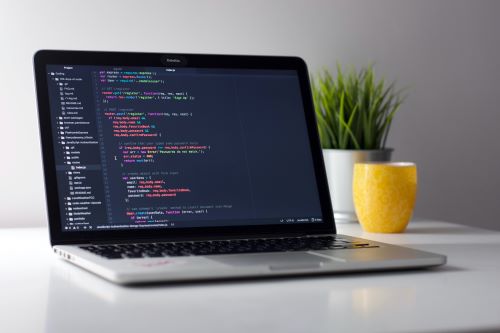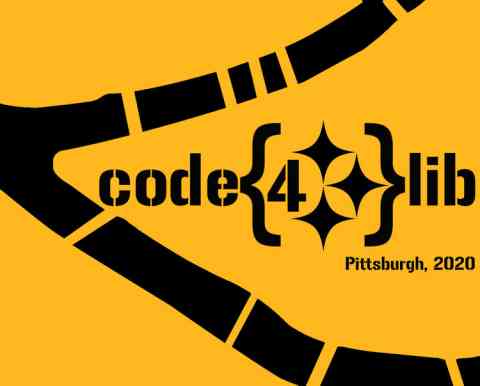
Each day in my role here at CMU Libraries, I'm steeped in everything data. I really enjoy getting to teach other people data skills while also honing my own skills in the process! However, it hasn't always been easy. In fact, for a long time, I've always found it quite intimidating to learn new data and technology skills. Part of that intimidation was never feeling like I fit in with data science and technologist communities. So, you can imagine how excited I was earlier this year when I learned that several of my colleagues at CMU Libraries were bringing Code4Lib to Pittsburgh on March 8th-11th! In this installment of Tartan Datascapes, I'm thrilled to be featuring my three colleagues Ann Marie Mesco, Jason Glenn, and Ken Rose, who undertook significant organizing efforts to bring this community to our city for their annual conference!
So, what is Code4Lib? Taken from the Code4Lib website, it is a community of 'developers and technologists for libraries, museums, and archives who are dedicated to being a diverse and inclusive community, seeking to share ideas and build collaboration.' The important word here is inclusive - as an organization, Code4Lib recognizes that these tech spaces can be exclusionary and make it difficult for newcomers to learn these skills. It is a collection of people (data scientists, programmers, technologists, librarians, etc.) who wanted to come together for a purpose and craft a space that is 100% built by the community, including the selection of speakers and preconference sessions (intensive skill-building workshops the day before the conference).
For Ann Marie, Jason, and Ken, they knew that they wanted to bring Code4Lib to Pittsburgh for their annual conference, and put together a winning proposal to bring the community to our city in March 2020. They knew bringing this conference to Pittsburgh would benefit so many people in our tech, data science, and librarian communities here, and a great way to show off all the cool things in our city (for example, did you know that anyone who registered for the conference got free admission to the Heinz History Center?)! The conference brought together almost 300 people to talk about open repositories, data tidying, archives, Git, metadata, and a host of other fascinating tech topics.
While interviewing Ken, Ann Marie, and Jason, I couldn't help but draw comparisons to the DIY (do-it-yourself) punk scene where a collective of people produce their own music and build community without interacting with the mainstream music industry (If you have no idea what I am talking about, check out this great Medium article on DIY punk in New York. And, if you do know what I'm talking about, you likely saw my little Easter egg in the title of this blog post (not quite DIY punk, but still in the genre).
Because this is Tartan Datascapes, I was certainly interested in the conference itself but I really wanted to better understand all the data that went into planning the event - and it turns out, it was a lot! According to the three, it was an exercise in reacting and responding to rapidly changing qualitative and quantitative information sources! Everything from the community-curated talks and preconference sessions (which required analyzing lots of survey data from the forms used for voting) to assessing evolving data on COVID-19 and winter weather patterns (after all, this was early March in Pittsburgh!) during the conference meant the organizers had to be flexible throughout the entire process. Bringing this conference to Pittsburgh was truly a work in collecting, analyzing, and using data! The group used free collaborative tools to organize all the various tasks and data sources within their conference planning, including Google Sheets/Docs/Forms and Trello, which allows a user to split up big projects into smaller 'chunks', making it more manageable.
Ann Marie, Jason, and Ken also shared that to make this conference happen, it took a whole community! There was a broader CMU Local Planning Committee (LPC) which included over a dozen folks from our Libraries system who dealt with marketing, A/V, social activities planning, and many other important logistics. There were also several CMU Libraries folks who volunteered during the conference, including our very own Matt Lincoln who stepped in last minute to do a presentation when another speaker had to withdraw, and Jon McIntire, whose artistic design was chosen for the official 2020 conference t-shirt (you can see the design below)!

Image description: the winning t-shirt design, which is yellow and black and features the words "Code4Lib, Pittsburgh 2020" within a design mimicking Pittsburgh's triangle-shaped topography.
Below is a full list of all the CMU Libraries staff and faculty who helped make this conference a reality:
- Julia Corrin (LPC/Onsite Volunteer)
- Rashid Siddiqui (LPC; T-shirt; Built hosting proposal VM)
- Angelina Spotts (LPC)
- Jessica Benner (Scholarship Committee Chair; A/V)
- Emma Slayton (Social Activities)
- Katie Behrman (Social Activities)
- Joe Mesco (A/V)
- Maranda Reilly (Winning hosting proposal website design)
- Shannon Riffe (Marketing)
While much of Ann Marie, Jason, and Ken's work happened prior to the conference, this didn't mean the work stopped once the conference started! On the actual days of Code4Lib, it was an all-hands-on-deck environment which meant that many of the organizers missed the sessions themselves, but luckily they were able to view several of the presentations after the conference on Open Science Framework and on YouTube.
Are you interested in attending Code4Lib 2021, which will be a virtual conference? Watch the Code4Lib website for information as the conference planning evolves (and, our very own Ann Marie is going to be involved in the planning process again!). One of Code4Lib's big strengths is everyone being in one room and listening to the talks, and then afterward speaking amongst each other and finding collaborations. In a virtual world, it takes some unique methods to recreate this, but rest assured that the Code4Lib 2021 planning team is working hard to bring this experience to the virtual meeting. Even during a pandemic, Code4Lib is a community that wants to share information as widely and inclusively as possible, and there are even scholarships to attend!
